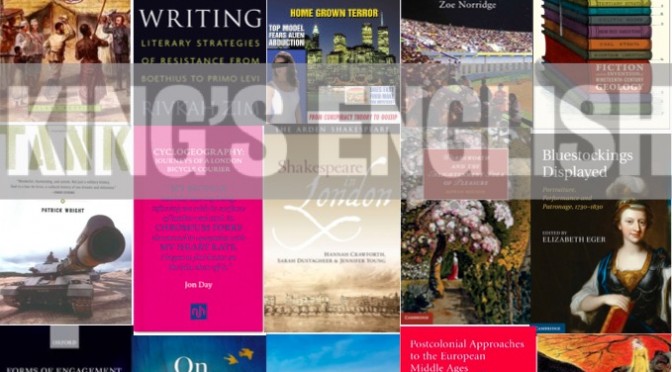King’s English provides a means of sharing current research, ideas and activities in and around the Department of English at King’s College London. Our readership encompasses the staff, student and alumni bodies of the department, as well as interested readers throughout and beyond academia, literature and the arts.
Just like the department at King’s, the blog entails both rigour and creativity. While we are non-prescriptive with regard to content and style, existing blogposts should give a good sense of how to compose a contribution: what to write about, how to write, and where these decisions veer from conventions of academic practice.
Blog posts on King’s English represent the views of the individual authors and neither those of the department, nor of King’s College London.
To contribute a post to the blog, please contact the editors Alexander Giesen and Samantha Seto at blog.english.kcl@gmail.com.
Style Guide
- Generally, blog posts should be between 800 to 1,000 words.
- In exceptional cases, we may consider a longer post. Please contact us at blog.english.kcl@gmail.com to discuss this.
Structure:
- Bring lucid examples and ideas to the front of your writing: the first paragraph is what will be seen on the blog homepage.
- Posts don’t need an argumentative structure, introduction or conclusion. They can be a meditation, a conversation, or a story.
- Shorthand your ideas through images, links or other interactive media.
- Whilst your jumping off point might be a book, event, performance or talk, your post should have a thrust and identity of its own, moving beyond it towards a broader, stand-alone piece.
Grammar:
- Let paragraphs and sentences punch in on verbs, nouns and prepositions, dropping conjunctions where you can.
- You might use shorter, more conversational sentences than in research publications.
- Signal field-specific terms or writing styles for the non-specialist reader.
References:
- Only exceptionally will we use endnotes on the blog. Readers aren’t expected to follow up on research outside of your post, so make sure that it contains everything they need to appreciate what you are saying.
- You can use hyperlinks to direct readers to other online sources (articles, media, events and so on) and create conversations with other bloggers.
Capitals, acronyms, accents, etc:
- Acronyms should be used with the non-specialist in mind, but can be hyperlinked. Don’t separate with full-stops (eg. MA in Performance Studies).
- Don’t accent words that have found their way into the English language (eg. cafe). If using loan words please italicise.
Formatting contributions:
- Please underline anything that can be hyperlinked, and include the URL in brackets in the body of the text.
- Please send your images alongside your contribution, in the email, marking in brackets in the body of the text if you have a preference on where these images are placed.
On academic blogging:
- An article on the pros of academic blogging.
- Some examples of the most popular academic blogs.
- Some tips on academic blogging.
- An article from our founding editors Penny Newell and Ella Parry-Davies, ’10 ways to make public engagement work for you’ and some resources related to their training programme Research with Reach.
- A spotlight on Melissa Terras, Professor of Digital Humanities in the Department of Information Studies, University College London, and Director of UCL Centre for Digital Humanities, who blogs here.

